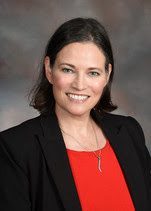NC Teacher of the Year a finalist for national honor
Published 12:00 am Thursday, January 28, 2021
Maureen Stover, the 2020 Burroughs Wellcome North Carolina Teacher of the Year, has been selected as one of four finalists for the 2021 National Teacher of the Year. The finalists were announced today by the Council of Chief State School Officers, which facilitates the prestigious recognition program.
Stover, a science teacher at Cumberland International Early College High School in Fayetteville, is the first teacher from North Carolina to compete for the national honor since 2008, when Cindi Rigsbee, an Orange County middle school teacher, was a finalist. North Carolina’s last National Teacher of the Year was Donna Oliver, from Hugh Cummings High School in Burlington, in 1987.
Stover was named North Carolina’s Teacher of the Year last summer, from a field of eight regional teachers of the year and one charter school nominee.
CCSSO’s National Teacher of the Year Program identifies exceptional educators across the country, celebrates their work in and outside the classroom, and through a one-of-a-kind professional development opportunity, helps them amplify their voices and empowers them to take part in policy discussions at the state and national level.
A former intelligence officer in the U.S. Air Force, Stover began her teaching career 12 years ago in Florida through the federal Troops to Teachers program. Stover has been teaching biology, earth and environmental science and AVID for the last three years at the early college in Cumberland County, where she holds a number of leadership roles.
Known to her students as the “Science Mom,” Stover says that her students understand that her commitment to them extends beyond the 90 minutes of classroom instruction each day.
“My students are my ikigai,” Stover said. “In the Japanese culture, ikigai means life’s purpose. My ikigai is helping my students develop academically, socially and emotionally as they transition from adolescence into adulthood. … I have found that one of the most important parts of being a teacher is the relationships I form with my students.”
Beyond helping students achieve academic success, Stover said, “my role as a classroom teacher is to be part giver of knowledge, part cheerleader, part counselor, part mom, part nurse, and part what my kids need me to be that day.”
State Superintendent Catherine Truitt said all North Carolinians should be thrilled that one of our state’s teachers is in the running for this year’s national title.
“Especially in a year when we know that teachers everywhere are going the extra mile for students,” Truitt said, “the news that Maureen has been selected for this high honor only highlights the tremendous contributions from teachers across North Carolina. Maureen’s students are fortunate to have a teacher who is so passionate about their learning and success.”
Eric Davis, chairman of the State Board of Education, said that as an advisor to the board, Maureen has shown herself to be a strong and persuasive leader.
“In just a few short months as a Board advisor, Maureen has become a highly effective spokesperson for her fellow teachers and a powerful advocate for students,” Davis said. “She’s not afraid to share her perspective, to address challenging issues, and to speak with courage and conviction.
“On behalf of my State Board colleagues, we extend our heartfelt congratulations and appreciation for demonstrating the best in teacher leadership in North Carolina.”
With an undergraduate degree in biology from the United States Air Force Academy, Stover has gone on to earn two master’s degrees in education, one in curriculum and instruction with an emphasis in STEM education from Adams State University in Colorado and another last year in secondary science education from Western Governors University in North Carolina.
She knows that many of her students may opt for careers unrelated to science, but she still wants them to be able to lead and make informed decisions as adults in a world where they’ll interact with science every day for their entire lives.
“I want to ensure that my students are prepared to talk about science, to read about science, to understand science, and to make decisions based on science,” Stover said. “It will be important for each of my students to develop the ability to apply their science knowledge to a variety of situations, from understanding a doctor’s diagnosis to determining the environmental impact of a purchase as simple as a one-time-use water bottle.”
She uses a variety of approaches to teach her students, from reading activities to videos to direct instruction and teacher presentations to podcasts and hands-on learning. She evaluates students with non-traditional performance assessments keyed to students’ preferred learning styles. For one unit, she said, students worked in pairs to write a song or a poem to demonstrate their understanding of the material. One student played her ukulele; another played her flute.
“Because students had an opportunity to show their knowledge by developing their own project,” Stover said, “they took ownership of the assignment and were excited to demonstrate their knowledge of the concept.”
Yet, she’s also a strong believer in data-driven instruction to personalize her lessons to meet the individual learning needs of her students. During the past three years, Stover worked with her principal to develop a school-wide initiative that uses data points to identify at-risk students and provide the support that they need. She leads a professional development effort at her school to help teachers understand and effectively use the EVAAS tool that projects individual student growth and to use other sources of data to assess students’ mastery of standards and objectives. As part of that effort, she also created a data-tracking tool that helps teachers see where students need extra practice, instruction or support.




